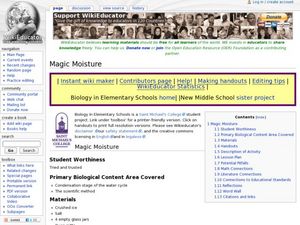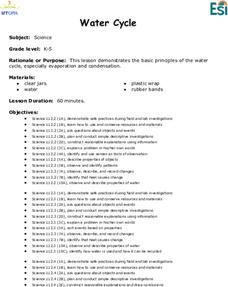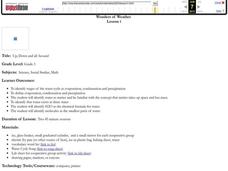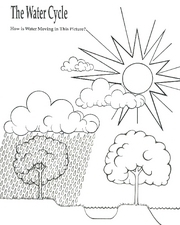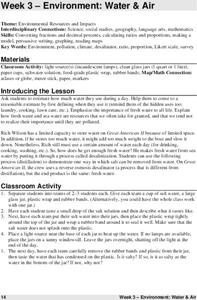Condensation Teacher Resources
Find Condensation lesson plans and worksheets
Showing 984 resources
Curated OER
Exploring the Water Cycle
The water cycle is one of earth's most easily observable processes, but demonstrating each step within classroom walls can be a challenge. Through a series of videos and quick demonstrations, cover each aspect of the hydrologic cycle in...
Foundation for Water & Energy Education
What is the Water Cycle? Activity B
Curious physical scientists follow a instructional activity on the properties of water with this instructional activity on distillation. They observe a miniature water cycle model that filters dirty water into clean water. These two...
Curated OER
How Do You Dew?
Students examine how the processes of condensation and evaporation occur. They describe the relationship between heat energy, evaporation and condensation of water on Earth. They give examples of the processes of evaporation and...
Curated OER
Physical Changes and States of Matter
Fourth graders study evaporation and condensation as parts of the water cycle. First they determine the similarities and differences between a cup of water and an ice cube before measuring the volume of ice before melting it, and...
Curated OER
Rain, Rain, Go Away
Students conduct a number of experiments involving evaporation and condensation. They view and discuss a video about the water cycle and then design posters about the rain based on the book "Cloudy With A Chance of Meatballs".
Curated OER
The Atmosphere and Flight
Students investigate evaporation and condensation, and apply the concepts to understanding cloud formation.
Curated OER
Magic Moisture
Students discover the process of condensation. For this experimental lesson, students hypothesize and conduct an experiment to determine where the water comes from during condensation.
Curated OER
Water Cycle
Pupils perform experiments with water to observe the principles of evaporation and condensation. They make models of the water cycle and discuss the processes that occurred in their experiments with their jars of water.
Curated OER
What is the Water Cycle?
In this water cycle worksheet, students will write in a description for the 3 stages of the water cycle: evaporation, condensation, and precipitation. This worksheet is a graphic organizer.
Curated OER
Moist Air & Clouds
Fifth graders study the weather and water cycle of clouds. In this water cycle lesson, 5th graders read background information about evaporation, condensation, and the states of water.
Curated OER
Wonders of Weather
Fourth graders complete activities to study weather and the water cycle. In this water cycle lesson, 4th graders observe a demonstration of the three stages of water. Students work in groups to complete a water cycle lab activity....
Curated OER
Splish Splash
Learners study drinking water. In this environment lesson, students draw the path of drinking water from the place of precipitation to the tap after researching a map and information from the United States Geological Survey water...
Curated OER
States of Matter
By viewing this PowerPoint your students' understanding of molecular energy should increase. The properties and inter-particular forces are summarized. The logical progression of information is useful, but more data to demonstrate...
Curated OER
Evaporation and Condensation
Students explore how temperature affects the processes of evaporation and condensation.
Curated OER
Weather and the Water Cycle
Second graders discover the causes of different types of weather. They draw pictures of the water cycle steps and answer worksheet questions. Students observe teacher-conducted demonstrations exemplifying condensation and evaporation.
Curated OER
A Chemical Curiosity
For this chemical change worksheet, students review physical changes such as evaporation and condensation before working with chemical change. They conduct an experiment with vinegar and baking soda before recording the chemical changes...
Concord Consortium
Specific Heat and Latent Heat in Condensation
There's more to melting than meets the eye! Junior physical chemists investigate the differences between specific and latent heats as a substance undergoes a phase change. Users remove heat from the system and observe changes in kinetic...
Curated OER
THE WONDERFUL WATER CYCLE
Students are introduced to the processes of evaporation and condensation as they observe physical changes in water. They observe how matter changes from a solid to a liquid state. Students are explained that steam is water in its gaseous...
Curated OER
Cloud In a Bottle
In this cloud worksheet, students use a clear plastic bottle to simulate the process of cloud formation. They drop a lit match into the bottle that contains water and shake it to form condensed water or clouds. They answer questions...
Curated OER
WS 10.7 Organic Nomenclature, Part 2
In this organic molecules instructional activity, students are given fifteen organic molecules to name, write the complete structural formula, write the line formula and write the condensed structural formula.
State of New Jersey
The Water Cycle - How is Water Moving in This Picture?
Here is a picture of a landscape, complete with the sun, clouds, and some rain. Use it by projecting onto your whiteboard and drawing arrows and labeling three main steps in the water cycle as you teach, or hand it out to little ones as...
Curated OER
Environment: Water & Air
The introduction to the lesson mentions a sailor's limited capacity to store drinking water on his ship. Pupils then set up an overnight experiment to remove freshwater from salt water by distillation. There is a math and map activity to...
Curated OER
Seashore Explorers
There are three separate lessons within this resource that can be used together, or that can each stand alone. In the first, five simple activities allow junior scientists to examine the amazing properties of water. In the second, they...
Curated OER
What's Up With the Water Cycle?
Students explore the water cycle. Students identify the stages in a water cycle and create a PowerPoint presentation based on their knowledge.








